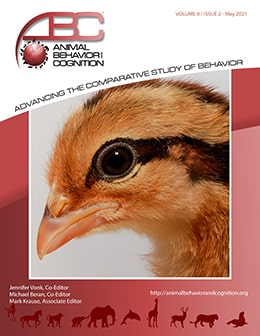Vol 8, Issue 2, May 2021
The Legislative, Ethical, and Conceptual Importance of Replicability in Farm Animal Welfare Science
Citation
Nawroth, C., & Gygax, L. (2021). The legislative, ethical, and conceptual importance of replicability in farm animal welfare science. Animal Behavior and Cognition, 8(2), 247-250. https://doi.org/10.26451/abc.08.02.11.2021
Abstract
In this commentary, we discuss three replicability issues that are specifically relevant to research regarding farm animal welfare: (1) Legislative action, and its potential economic consequences, should derive from robust and replicable research to benefit animals kept in an industrial setting. (2) From an ethical perspective, the use of relatively few additional animals in replication studies in farm animal welfare science can be justified in comparison with the high numbers of animals of the same species that are routinely kept in millions for production purposes. (3) Conceptually, studies in farm animal welfare science can take advantage of heterogeneous farm settings that can serve as the population for sampling and, accordingly, follow a framework that improves external validity and thus increases replicability. In light of these issues, animal welfare scientists should more strongly embrace measures to increase replicability in their research.
Keywords
Farm animals, Heterogenization, Replicability, Welfare
